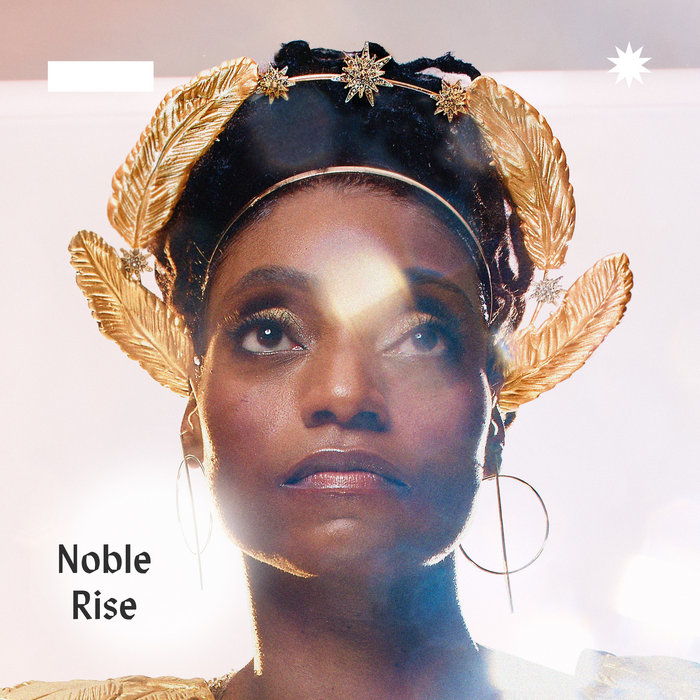In the video for Noble Rise, the epitome of musical collaboration is dynamic. An exquisite conversation is captured in a montage with alto saxophonist Lakecia Benjamin on her solos and her core band Phoenix in the studio while fellow alto saxophonist Immanuel Wilkins plays his solos from his home. Joining in is guitarist Mark Whitfield. This is the jazz version of the apotheosis we find in classical chamber music when each musician stands out for their individuality just as much as they do for their contributions to ensemble chemistry.
Noble Rise signifies a new chapter in Benjamin’s artistry, which the alto saxophonist describes as the entry point for a new “regal era” in her musicianship. As Noble Rise symbolizes, Benjamin, a five-time Grammy nominated musician, composer, arranger and composer who has collaborated with an impressive number of the contemporary age’s most respected jazz musicians, sees herself as a benevolent, humble, compassionate, impeccably understating artist.
In an interview with The Utah Review, Benjamin said that for her, “the regal part of sovereignty implies the willingness to do service because a real leader does not try to dictate solely through their own example.” At a time when far too many spaces in so many walks of life seem vacant when it comes to the presence of integrity and respect, Benjamin’s artistic mantra underscores how musicians in so many realms of practice and expression have done away with genre boundaries and distinctions in ways that seem more effectively natural when it comes to making music.
This week, Benjamin and Phoenix will perform as the second concert of the current season in UtahPresents’ blockbuster Jazz Series, on Oct. 23 at 7:30 p.m. in Kingsbury Hall at The University of Utah.
Name a current prominent jazz musician and Benjamin has likely collaborated with that artist. That includes Christian McBride, the multiple-Grammy-Award-winning upright bass master and composer, who performed with his core band Ursa Major last February, as part of UtahPresents’ jazz offerings. In 2020, she released Pursuance: The Coltranes, an album that garnered three Grammy nods. The set included six tunes each by Alice and John Coltrane, with Benjamin leading a large cast that included former Coltrane sideman Reggie Workman. In 2023 she returned with the fantastic Phoenix, which fused jazz, funky soul, R&B, and hip-hop with many elite jazz musicians.
In a 2024 interview with Stereogum, Benjamin explained how her music hits harder than other classical forms of jazz that can be more contemplative and subdued: “I just believe there’s music for all occasions…There’s music for some people that need to get on a dance floor. There’s music for people that are going through grief, there’s music for people that need inspiration and all of these things can exist at once. You know, we can all listen to Alice, and because she’s so intense and powerful, we can play an intense ballad, or we can play an intense, you know, meditative song, or we can play an intense, really high-energy spiritual song.”
In between her 2020 and 2023 releases, Benjamin suffered multiple injuries in a September 2021 auto accident. She suffered a broken jaw, three broken ribs, a broken scapula, a brain bleed, and a perforated eardrum. During her recovery, Benjamin embraced the Phoenix metaphorical imagery of life after pain. “It became a journey of perseverance and how far you can get from a place of adversity,” she added. Noble Rise became that artistic milestone in her journey.
Benjamin has enormous gratitude for musicians she considers as artistic mentors. They include Terence Oliver Blanchard, jazz trumpeter and composer who has written two operas and more than 80 film and television scores, including two films by Spike Lee. Another is Jason Moran, jazz pianist and composer, who has collaborated on major multimedia art and theatrical installations. Both also are distinguished educators, a role that Benjamin prizes just as enthusiastically in her life as a musician.
Jazz is far more ubiquitous than what many music lovers might realize. For example, Beyoncé has employed jazz musicians in her bands, most notably in her original all-female band. They have included saxophonist Tia Fuller, trumpeter Crystal Torres, and drummer Nikki Glaspie. Likewise, prominent rappers such as Common, Gang Starr, A Tribe Called Quest, and Digable Planets have a robust connection to jazz. Common, for instance, formed the jazz rap trio August Greene with Robert Glasper and Karriem Riggins and has talked about Coltrane, Miles Davis and Herbie Hancock as important influences.
As for emerging young jazz musicians, Benjamin offers straightforward advice about not being a shrinking violet in a competitive and intensely demanding musical scene. “Listen and learn everything so you can play it any time,” she explained. “Don’t hesitate to seek out people by looking them up on social media and don’t be afraid to send them a video clip. Be persistent. Don’t hesitate to DM [direct mesage] them and write about what you heard in their shows.” Unquestionably, in Benjamin’s astute ideals behind Noble Rise, mentoring in music is most impactful when it is a dynamic, symmetrical relationship that prioritizes a reciprocal empathetic engagement over the old school formidable hierarchical exchange of knowledge and experience.
For tickets and more information, see the UtahPresents website.


